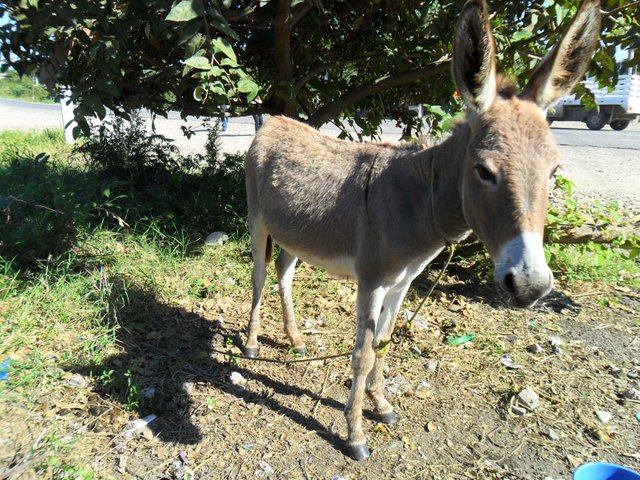Why did the donkey die?
Why did the donkey die?
Once my family and I were traveling in a cart through the countryside, when we saw a donkey standing near the road. He was so skinny that we only looked like leather and bones.
Poor donkey-we said a voice. He's probably sick.
When we approached him, we saw something that filled us with pity. Someone had tied the mouth of that animal!
The donkey's efforts to open the mouth proved futile. The rope cut like a knife and the blood painted his nose.
I braked the wagon, I went down and walked to the unfortunate. I wanted to help him. I wanted to deliver it. He longed to remove the rope. I felt an inner satisfaction at the possibility of treating him with mercy. And with remarkable intent I approached him. But suddenly the animal started to run. A cloud of dust arose where it ran. He didn't let me even touch him, much less remove the rope.
Sadly, I went back to the car. A week later I went the same way. There I found the corpse of the donkey: the rope, tinged with blood, had his mouth shut yet.
That experience made me think of myself: Why did the donkey die? I almost immediately thought of the answer: The donkey died for someone to tied his mouth. Although it was true the answer, I was not satisfied with it. Because despite that he had a chance to get away with such bad luck. I could and wanted to deliver it.
Again I asked myself the question: Why did the donkey die? The second answer gave me more convincing.
The donkey died for not interpreting my intention well. The thought that I was going to do him some harm, and unfortunately his mistake cost him his life.
I repeat that I could help him and I wanted to deliver him. But the donkey did not believe it so: he fled, refused my offer, and died. If the donkey had understood the great desire of mine, he might have accepted my offer to deliver it. I said in my mind: poor donkey, poor donkey! Too bad I didn't understand my intention!
In reflecting a little more I came to the conclusion that the behavior of that animal is understood: it was donkey!
How could he interpret well being a mere donkey? You have to forgive him for his mistake and his unbelief.
Very often I have the opportunity to remember that donkey. The same mistake and unbelief is seen everywhere, especially in the spiritual. God's desire for us is very easy to comprehend: in the first place, his word clearly tells us that "He does not want any perish, but that all may proceed to repentance " (2 Peter 3:9) and that "He wants all men to be saved and come to the CONOCIM Slow of Truth "(1 Timothy 2:4).
It is also understood that God wants to save us by the provision he made for sinners. There are almost no people in our circle of friends who have not heard that Christ died for us on the cross. Perhaps they do not know the texts of the word of God such as 1 Corinthians 15:3: "Christ died for our sins according to Scripture," or that in Christ "we have redemption for his blood, the forgiveness of sins for the riches of His Grace " (Ephesians 1:7).
But they do know that it is. Christ invites sinners: "Come to me all who are worked and loaded, and I will make you rest " (Matthew 11:28). And he claims that "To me that comes, I do not throw him out" (John 6:37).
Thousands of sinners have believed in these promises of Scripture and have experienced that God's intent toward them is good. have been delivered from the bonds of sin.
You can walk in the way of God. They can eat the green pastures where the good shepherd leads them. They have found abundant life, eternal life.
Hearing the words of Christ at the time, some did not believe. To such he said to them: "And ye will not come unto me that ye may have life" (John 5:40). Surely they misinterpreted the Savior's intent. Although they were not donkeys, they behaved like the donkey of this story. Today there are many who make such a mistake.
Listen then, the invitation of God where he offers us the blessing: "I have put you before life and death, blessing and curse: Choose, therefore, life, to live you and your offspring, loving Jehovah your God, attending to his voice , and following to him; For He is life for you "(Deuterenomio 30:19-20).
